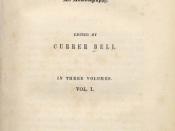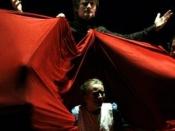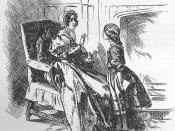"Learning comes through suffering" (pathei mathos), nothing more clearly represents the tragedy of Oidipous the King than this statement. Not knowing who he truly is and having construed his own identity based on the information he thought to be true but is false, Oidipous, through a process of self-discovery and pain, is able to unravel the mystery that is his identity. Oidipous the King is a tragedy that clearly depicts the irony in the saying that, "it is when one is blind that one can see the most clearly", because Oidipous must lose his sight to finally "see" that he is not invincible. Moreover, Oidipous must endure a tumultuous and tragic ride, which includes murdering his father, sleeping with his mother, and self-inflicted blindness. It is through all of these tragedies, however, that Oidipous is able to truly discover his identity. I plan to show that it is because of these turbulent times that Oidipous and Jane Eyre are morphed into the people they are, and that without their experiences and hardships it would be impossible for either of them to have the same identity they now possess.
Ironically, it is only when Oidipous is ripped from his throne and looses his sight that he seems to "see" that he does not have the answer to every riddle.
Oidipous comes to rise in the city of Thebes as the man who helped rid the city of the sphinx and help bring back balance to Thebes. It is only to avoid a potentially disastrous fate that Oidipous finds his way to Thebes in the first place. While still residing in Korinth, the city in which he was raised, Oidipous is told by the Healer-God, Apollo, that he is destined to bed with his own mother and kill his own father.
"At a banquet, someone drank too much. / Intoxicated, he called me a bastard son. / This weighed on me. I scarcely kept myself / in check throughout the day. But on the next, / I went to my father and mother to question them. / The offence distressed them - and the drunk who hurled it. / They cheered me up but all the same the affair / kept nagging at me, because the rumors spread. / Without my parents knowing, I traveled to / Delphi. The Healer-God, Apollo, sent me off, however, / without respecting what I'd come for. Instead, he told / me clearly to my grief vile terrible things. / I was bound to mate with my own mother, expose / to the world a family not fit to see, / become the killer of a man who fathered me"(pg. 151 line 778-90).
Instead of answering Oidipous's question, Apollo relays to him a prophecy equally disturbing. Not knowing that his parents in Korinth are actually not his blood parents, Oidipous flees Konrinth in hopes to avoid the fulfillment of the horrible prophecy: "After hearing this, and guided / by the stars, I gave land of Konrinth / a wide berth, and found retreat where I'd / not see those shameful oracles fulfilled"(pg. 151 line 794-96). When Oidipous arrives in Thebes and gains entry and a kingship by the defeat of the sphinx, it is as if he is the luckiest man in the world. He is made the king of Thebes and is praised by all citizens as the man that brought back hope to Thebes. Unfortunately for Oidipous doing this is what actually leads him to commit the acts he so dreads and fears to commit.
When the city of Thebes is in collapse due to the killing of Laios, Oidipous calls for Teiresias, a holy prophet, from which Oidipous hopes to find out where the root of all the cities troubles is centered. When beckoned, however, Teiresias tells of news that Oidipous cannot have fathomed and is in denial to believe: "I tell you this; this man you have been looking / for, among your threats and your decrees / about Laios's murder, he is here/â¦He'll be revealed a brother and a father / to his children in his house, husband / and son to her who gave him birth; wife-sharer / and the killer of his father"(pg. 142 lines 448-58). However, even with these prophecies Oidipous instinctively asserts that Kreon must have devised a plot to overthrow him as king. It is ironic that the same gift that led him to be king of Thebes is also what leads to his downfall. Having a riddle solving mind Oidipous instinctively has a quick and contrite answer to every problem, unfortunately for him this fact is what leads him down every path except the "right" path when attempting to unravel the truth of his identity.
Soon after Oidipous finally solves the mystery of his identity and realizes that he has fulfilled the terrible prophecies he so dreaded to fulfill. The circle of events that change his life forever and transform him into the person that he becomes is almost complete. The tragic chain of events that started with the killing of his father and sleeping with his mother than throws Oidipous a curveball, as he discovers his mother hung, "dangling / with the twisted rope around her neck" (pg. 166 lines 1263-64). His mother's apparent suicide along with the terrible feeling of guilt for killing his father and disgust for having unknowingly mated with his own mother is what causes Oidipous to reach the bottom of the barrel and in an act of desparation and helplessness do to himself what most could not even conceive.
As he found his mother hung like a wild beast "he unpinned and tore away the golden brooches / from the robes which she was dressed in, / raised them up and struck his own eyeballs, / yelling something like, you'll not look on the disgraceful / things I've done or have had done to me"(pg. 166 lines 1268-72). Oidipous cries out attempting to justify why he is blinding himself. These reasons clearly show his struggle and trial in trying to comprehend exactly what it is he has caused and why sight should not be a liberty extended to him: "why should I see / when there is nothing sweet for me to see? /â¦what's there to see that I can / love? /â¦If I had sight and went to Haides, I / don't know how I could cast eyes on my father, / or my unhappy mother, since I've done / such things to both that more than merits hanging. / How could the sight of my children delight / me when I look at them spawned as they were?"(pg. 168-169 lines 1332-1375). These internal struggles clearly show that Oidipous is flustered and confused which is a sharp contrast to the quick-witted riddle solver we knew of not long ago. For the first time in his life Oidipous does not have the answer to a problem and does not even try to formulate a quick response.
Oidipous has to endure these stuggles and challenges to have "sight" on the fact that he cannot solve every riddle and that might and power only account for so much. When he was at the height of his power, Oidipous didn't realize that the only place to go from there is down. Nobody put this better than the elder in the very end of the tragedy. Reflecting on the occurrences that led to Oidipous's fall the elder states, "People of Thebes, look, this is Oidipous. / He knew the famous riddles. He was a mighty king. / He was the envy of everyone who saw how lucky he had been. / Now he's struck a wave of terrible ruin. / While you're alive, you must keep looking to / your final day, and don't be happy till / you pass life's boundary without suffering grief,"(pg. 173 lines 1525-30).
Oidipous the King has many similarities with that of Jane Eyre, both tragedy and novel revolve around discovery, namely "identity". Both Jane and Oidipous endure their fair share of tragedy and hardship and due to these challenges they both owe who they are to the experiences they have had. In both the tragedy and novel both protagonists, Jane and Oidipous, emerge from their experiences having been changed drastically because of them. In Jane Eyre, however, the change was more obvious than Oidipous as being a first-person narrative the reader had the luxury of being able to know Jane's thinking and reasoning, something not possible in Oidipous the King.
Jane Eyre is a novel about struggle and the perseverance of a young woman to succeed and achieve success in life against all odds. This success and triumph does not come over-night, as Jane must endure harsh blow after harsh blow before she can emerge from those experiences the Jane we know on page 504 rather than the Jane on page 1. From the beginning of the novel Jane is suppressed from being a free spirit and having the liberty to express herself living as an adopted child under the supervision of her deceased father's sister. Mrs. Reed is anything but warm towards Jane, as she seems to have a personal vendetta against her. Mrs. Reed makes this clear in the very inception of the novel. As she shows her displeasure towards Jane and her actions: "Jane, I don't like cavilers or questioners: besides, there is something truly forbidding in a child taking up her elders in that manner. Be seated somewhere; and until you can speak pleasantly, remain silent"(pg.13). This stern manner, however, is not also enforced on her own children, as Mrs. Reed allows them to mistreat Jane without any due punishment.
Jane's struggles and trials are evident when she gets sent to the Lowood Institution, which is a charity school, where young women with few or no relations go. At Lowood Jane meets one of the most influential people in her life, Helen Burns. Through Helen, Jane learns the intangibles of life at Lowood, namely "when life throws you lemons make lemonade." It is this same nonchalant attitude that Helen carries and uses to live her life. This is clearly shown when she is talking to Jane and explaining to her why she should not commit any hasty action when corrected by her teachers: "It is far better to endure patiently a smart which nobody feels but yourself, than to commit a hasty action whose veil consequences will extend to all connected to you-and, besides, the Bible bids us to return good for evil"(pg. 66). Through Helen Burns Jane is able to endure many of the turbulent times at Lowood as she implements many of Helen's teachings into her own life. This relationship marks the first major tragedy for Jane as Helen becomes ill and dies. But even in her death bed Helen preaches and makes light of her death saying, "I am very happy, Jane; and when you hear that I am dead you must be sure not to grieveâ¦we all die one day, and the illness which is removing me is not painfulâ¦by dying young I shall escape great sufferings,"(pg. 94). However, Jane does not die young so in turn by saying that she will escape great suffering because she is dying young Helen is almost foreshadowing Jane's future as Jane is not destined to die young. Helen is the single most important influence on Jane in the whole novel, as it is Helen that helps Jane lay down the building blocks of what is later to become an independent mature woman with strict morals and beliefs.
Throughout the book Jane seems to have endured a little more than what she would have had she not met Helen. In addition, one can see that throughout the novel Jane implemented Helen's teachings into her own life. No example illustrates this better than when Jane returns to Gateshed to pay tribute to her aunt Mrs. Reed, who is laying on her deathbed. At the tender age of nine Jane vowed she would never call Mrs. Reed her aunt ever again as she perceived Mrs. Reed had purposely tormented her life. Her promise, however, is quickly revoked when she returns to Gateshed, "How are you dear auntâ¦I had vowed that I would never call her aunt again: I thought it no sin to forget and break that vow, now"(pg. 259). Vividly showing that Helens teachings and death had a major impact on her maturity and growth as a person, Jane saw no reason to be bitter or hold any form of animosity towards her aunt Reed years after her abuse. Over the course of nine years due to her struggles and hardships to that point Jane already had drastic transformation in her character. Unfortunately for Jane, fate decided she still had room for growth, as her biggest obstacle and struggle was still to come.
The beginning of Jane's ultimate struggle is when she finds out that Mr. Rochester is already married to Bertha Mason, thus in turn she is his mistress. That discovery along with the feeling of betrayal is what ultimately leads Jane to reach the lowest point of her life. It is during this time that Jane does not compromise her morals and beliefs by wedding a married man and decides to flee Thornfield Hall in the early morning. When Jane leaves Thornfield Hall she knows that she is going to suffer and withstand tough times, however, as she was taught long before, "Better is a dinner of herbs where love is, than stalled ox and hatred therewith"(pg. 87). Although she is not hated at Thornfield she was clearly deceived purposely and hence was taken for granted by Fairfax. With all of twenty pounds Jane ventures out to be engulfed by a world she knows little about, as most of her life she has been constrained to dwell within four rectangular walls. The fact that Jane is going to have to grind out some tough times is an obvious fact, however, Jane has no idea of just how bad things are going to get. These experiences, however, turn out to be vital in Jane's development. In addition, in an almost unbelievable strike of good fortune Jane is able to unravel some of the mystery of her identity due to her leaving Thornfield and finding her way to Moor House.
Before her good fortune, however, Jane must endure the type of struggle and trial that is unheard of to most. Soon after her departure from Thornfield solitude and hunger is something that Jane quickly becomes aware of, as she is both lonely and hungry. When she is homeless and starving she reflects on her gloomy predicament, "I was driven to the point now. I was brought face to face with necessity. I stood in the position of one without a resourse: without a friend; without a coin. I must do something,"(pg. 366). Jane resorts to beg for whatever food she can, however, people aren't as giving as she might like. This is clearly the low point in Jane Eyre's life as she comes close to death from starvation after having it all and deciding to give it up at Thornfield. Her decision marks a clear point in Jane's life where her maturity and growth clearly come through in the text. In a life-changing decision Jane leaves the safe comfortable living situation at Thornfield for that of a bleak existence in a place unknown. She would rather reside in a place where she can pull her own weight and manage on her own than be spoon-fed all of her needs.
Through all of the ongoing misery and turbulent times both Jane Eyre and Oidipous are forced to change and become tolerant to such circumstances. If not for the constant struggle and trial neither Jane Eyre nor Odipous would presently have the mind state that each do. The process of discovery and struggle is what allows both of these protagonists to come away from their lowest points able to endure such pain still alive. It is naïve for anyone to believe that either Jane or Oidipous would be the people they are after all of their struggles without having to have endured them. It is these struggles and trials that lead both of them towards maturity and self-discovery.


